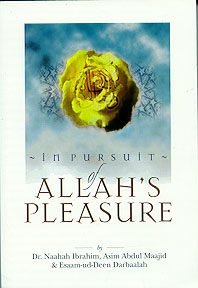In Pursuit Of Allah's Pleasure

Preface
All praise is due to Allah ( SWT ). We praise Him and seek His assistance. We ask for His forgiveness and take refuge in Him from the evil within ourselves and from the evil of our deeds. He whom Allah ( SWT ) guides will never be diverted yet whomever He sends astray will never find his way. I bear witness that there is no god but Allah ( SWT ) alone, He has no partner, and I bear witness that Muhammad is His servant and messenger.
On the authority of Abu Dardaa' (ra), the Messenger of Allah said:
"Verily, the scholars are the heirs of the Prophets."[1]
The righteous scholars are the heirs of the Prophets; Imams of the people after the Prophets; they guide and direct the people to Allah ( SWT ) and teach them His Deen; and they have noble manners and praiseworthy attributes. They are the scholars of the truth; scholars of guidance and successors to the Prophets; they fear Allah ( SWT ) much and are constantly checking their actions, and pay great importance to what He orders and forbids. They follow in the footsteps of the Prophets: in their teaching and instructing, their character and actions, their words and conduct and, as a result, they suffer in the same way that the Prophets did. The righteous scholars suffer persecution and oppression, mockery and ridicule, torture and imprisonment and murder in the same way that the Prophets did. They speak and uphold the truth wherever they go in order that the religion of Allah ( SWT ) may "be superior over all other religions even though the disbelievers may detest it,"[2] and they pay for it dearly.
On the authority of Anas bin Malik, the Messenger of Allah said: "Among the signs of the Hour will be the disappearance of knowledge and the appearance of ignorance." [3]
Ibn Hajar Al-Asqalanee said, commenting on this Hadeeth: "Indeed it will not disappear except with the deaths of the Ulama."[4] In this day and age, how few are the scholars that are suffering for no other reason except that they are speaking the truth. Some of them have been assassinated and some of them have been imprisoned, whilst others still remain under house arrest.
This book, "In Pursuit of Allah's Pleasure" is the translation of a book titled: "Al- Meethaaq Al-Aml Al-Islami" (The Charter for Islamic Work) written by three scholars: Dr. Naajeh Ibrahim, Asim Abdul-Majid and Esaam-ud-Deen Darbaalah and released from behind the bars of Liman Turrah Prison, Egypt, in February 1984. The checking of this book was carried out by Dr. Sheikh Umar AbdurRahman, currently serving a life sentence in the USA, for no other reason than upholding the truth.
In this book the authors outlined a complete methodology for Islamic work today. From `Aqeedah to Da'wah, Jihad to Khilafah and Taqwa to Sabr (patience), they explained how all of these parts of Islam come together for the sole objective of each and every Muslim: to seek the Pleasure of Allah ( SWT ), the Irresistible. It was written in a manner portraying the true situation of the Muslims today and, coming from imprisoned scholars: a realistic portrayal.
This book is an excellent read by itself and an even better guide if used as a syllabus in learning Islam in an organised, collective manner. It is ideal as a basis for study circles and acts as a comprehensive manual. Coupled with the supplementary reading of some other books in the English language and memorisation of the Holy Quran, it can consolidate the knowledge of anyone seeking to work for Islam in this day and age.
We ask Allah ( SWT ) to accept the efforts of these scholars and protect them. To make this book a means of reviving the glory of His religion. To make our actions sincerely for His Sake and to include them on our Scale of good deeds on the Day of Judgement.
Ameen.
[1] Classified as Sahih by Ahmad, Abu Dawud and Ibn Maajah.
[2] Surah At-Taubah (9), Ayah 33.
[3] Sahih Bukhari and Sahih Muslim.
[4] Fath-ul-Baaree. Vol. 1, Page 239, Hadith No. 80.
